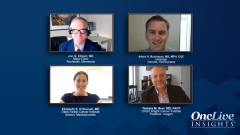
Cancer Screening and Management: Overview of the Current Landscape
A panel of esteemed cancer experts explore the challenges and opportunities in cancer screening and identification, shedding light on the evolving landscape and its impact on clinical practice.
Episodes in this series

Transcript:
Elizabeth O’Donnell, MD: Hello and welcome to this OncLive® Insights program…. I’m Betsy O’Donnell from the Dana-Farber Cancer Institute [in Boston, Massachusetts]. I’m the director of the Multi-Cancer Early Detection clinic, and I am joined today by a panel of cancer experts. I would like to ask our esteemed colleagues to go ahead and introduce themselves.
Jon O. Ebbert, MD: I’m Dr Jon Ebbert from Mayo Clinic [in Rochester, Minnesota,] and medical director for the Nicotine Dependence Center.
Tomasz M. Beer, MD, FACP: I’m Dr Tom Beer, adjunct professor of medicine at the OHSU [Oregon Health & Science University] Knight Cancer Institute, and [I am] vice president and chief medical officer for Multi-Cancer, Early Detection, and Exact Sciences.
Adam H. Buchanan, MS, MPH, CGC: Hi, I’m Adam Buchanan. I’m chair of the Department of Genomic Health at Geisinger, and I laid out multicancer early detection research…. Today, we’re going to discuss the emerging landscape surrounding broad-based multiyear cancer screening methods for early detection and diagnosis. We’ll discuss the data in the context of guidelines, the treatment landscape, and its impact on clinical practice. Let’s get started. We’re going to start with Dr Ebbert, a question for you. [What is] the current landscape surrounding the burden of cancer?
Jon O. Ebbert, MD: Thanks for the question, Adam. Cancer is a major public health concern worldwide, and it’s the second leading cause of death in the United States. And it’s on target to be the leading cause of death by 2030.
Adam H. Buchanan, MS, MPH, CGC: And where would you say the greatest challenges lie?
Jon O. Ebbert, MD: I would say there are a couple of challenges. One is that vulnerable, underserved populations experience higher cancer incidence and mortality rates and that our cancer incidence mortality rates are high. We have approximately 1.9 million new cancers diagnosed each year. About 1 in 2 men or 1 in 3 women will develop cancer in their lifetime, and there are more than 600,000 deaths each year.
Adam H. Buchanan, MS, MPH, CGC: Thank you. And then if you could pivot to discussing the current landscape surrounding standard-of-care cancer screening….
Jon O. Ebbert, MD: Cancer screening is foundational in our fight against cancer. Benefits…obviously [include] the detection of cancer in earlier stages when cancer is more treatable and there are fewer [adverse] effects and reduced morbidity and mortality from treatment. The USPSTF [United States Preventive Services Task Force] recommends screening for only 4 cancers: breast, lung, colon, and cervical. However, approximately two-thirds of incident cancers in cancer deaths are from cancers with no recommended screening options.
Adam H. Buchanan, MS, MPH, CGC: So that alludes to some of the current challenges for paradigm and standard-of-care screening. What are some other challenges there?
Jon O. Ebbert, MD: There [are] barriers and those barriers are on the patient side and on the provider side; there [are] emotional barriers on the side of the patients related to…some of the procedures themselves. In 2019, a survey of patients in the safety net primary care sites said that only 46% were up-to-date on colorectal cancer screening. Also, respondents mentioned that 12% of them felt discomfort or even disgust with some of the procedures, most likely [colonoscopy] prep, which many of my patients find very unpleasant.
And nearly one-third of respondents worry about the procedure itself. There’s a lack of awareness regarding cancer risks or screening benefits. Providers either don’t give this information to patients, or patients hear it but they don’t understand it. And they don’t prioritize it because they don’t understand it, they don’t prioritize the screening. And that same survey mentioned above from 2019, 16% of respondents stated screening was a low priority for them…. A lot of my patients are concerned about costs, co-pays, transportation, and time away from work. Colonoscopy itself takes 2 days away, and you need to find a driver to get you there....
Adam H. Buchanan, MS, MPH, CGC: On the flip side, what would you say works well about the current paradigm of standard-of-care screening?
Jon O. Ebbert, MD: What I would say works well with the standard-of-care screening [is] that we are able to detect cancers, and when we can detect some of the cancers, we do intervene early with them. Sometimes when patients present with symptoms, it’s usually more advanced stages of cancer.… I would say that the current recommended standard for screens has shown clinical benefit.
Transcript is AI generated and edited for readability.

































